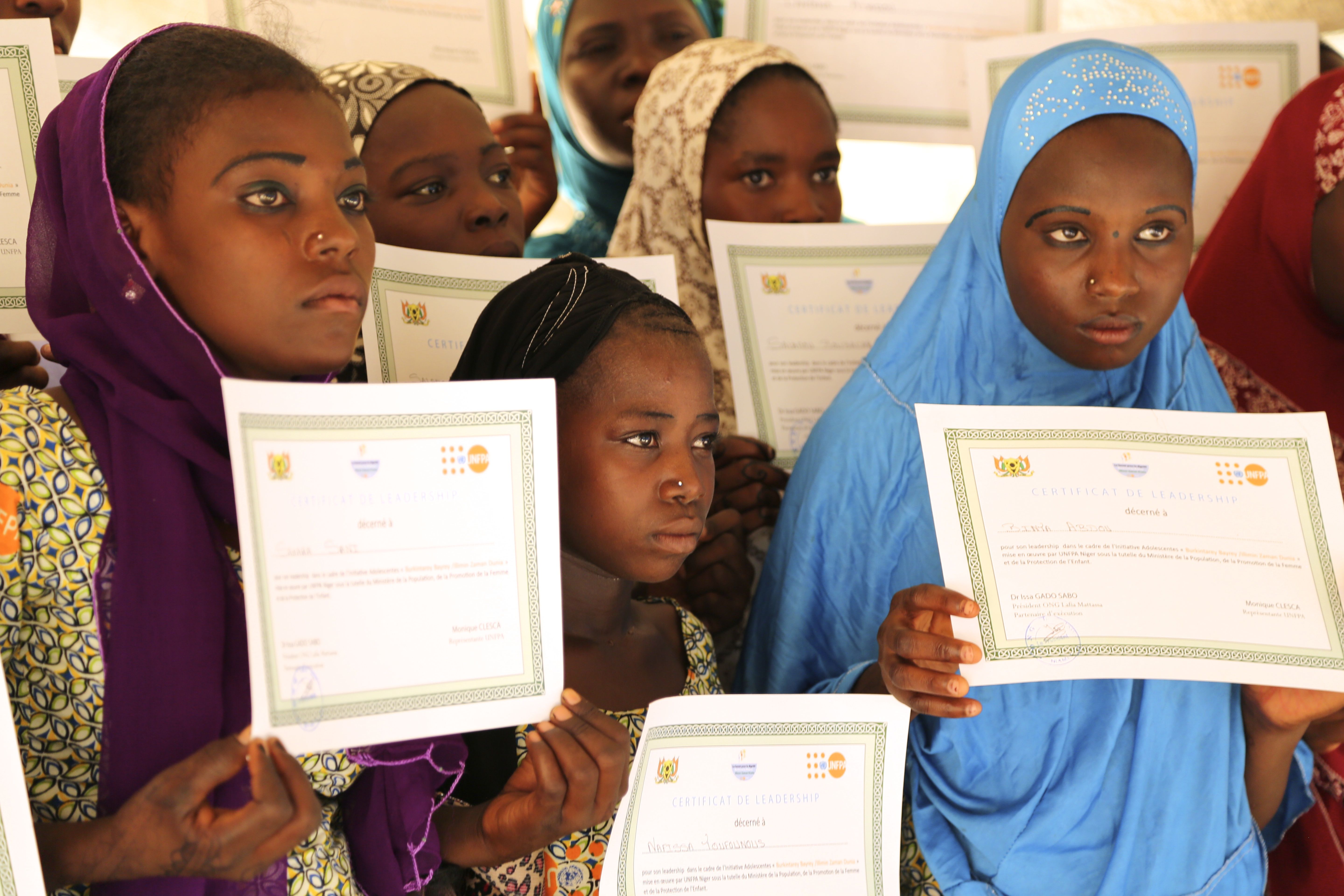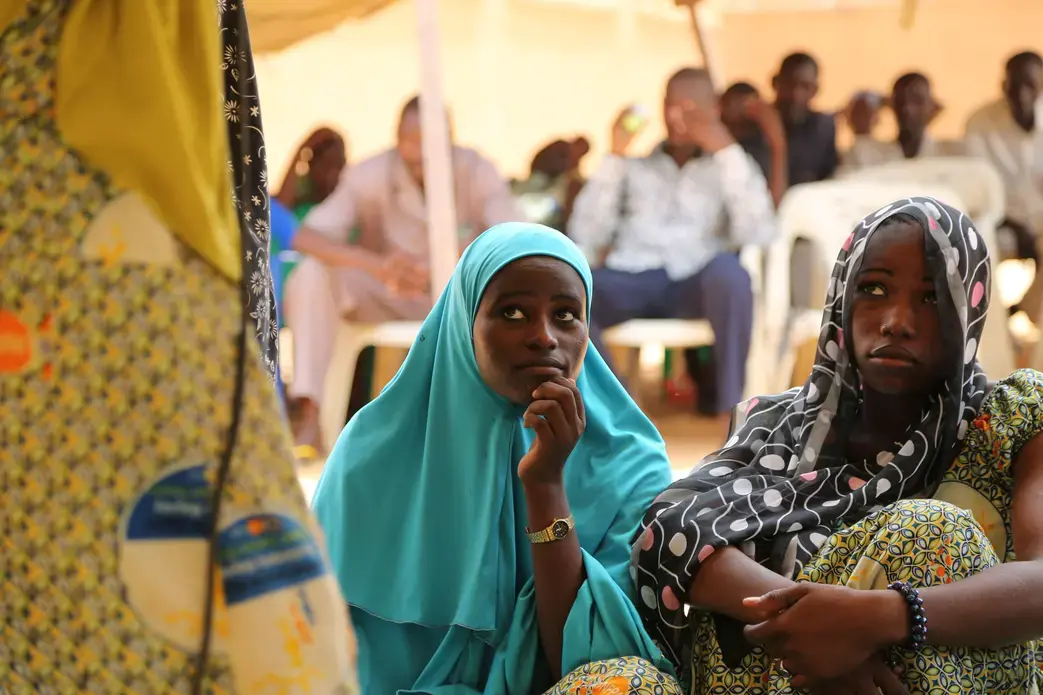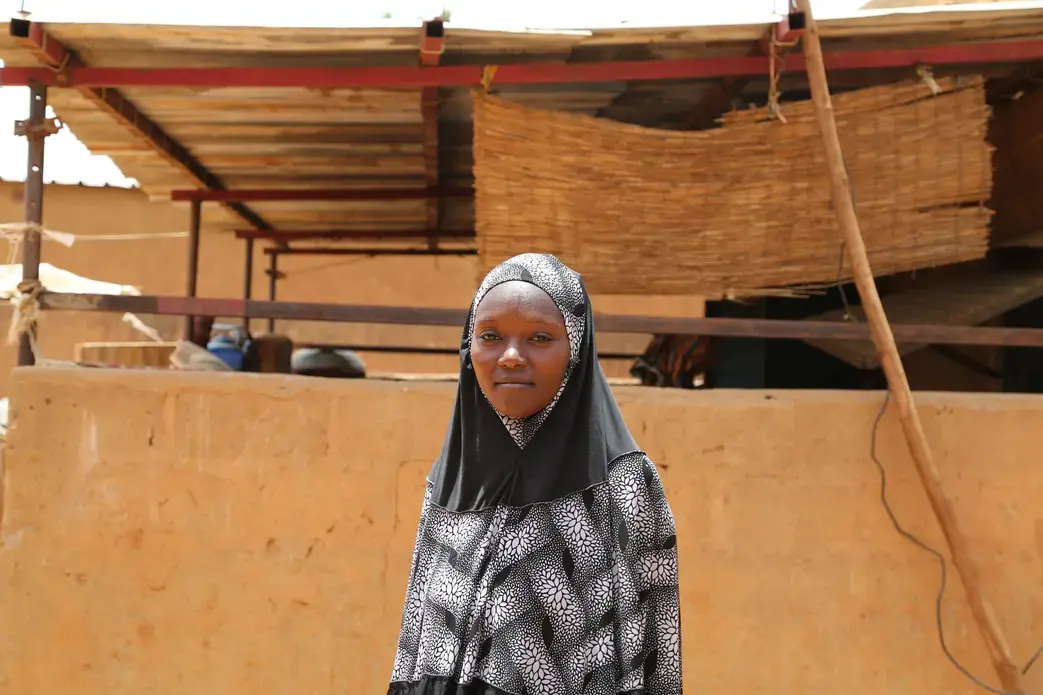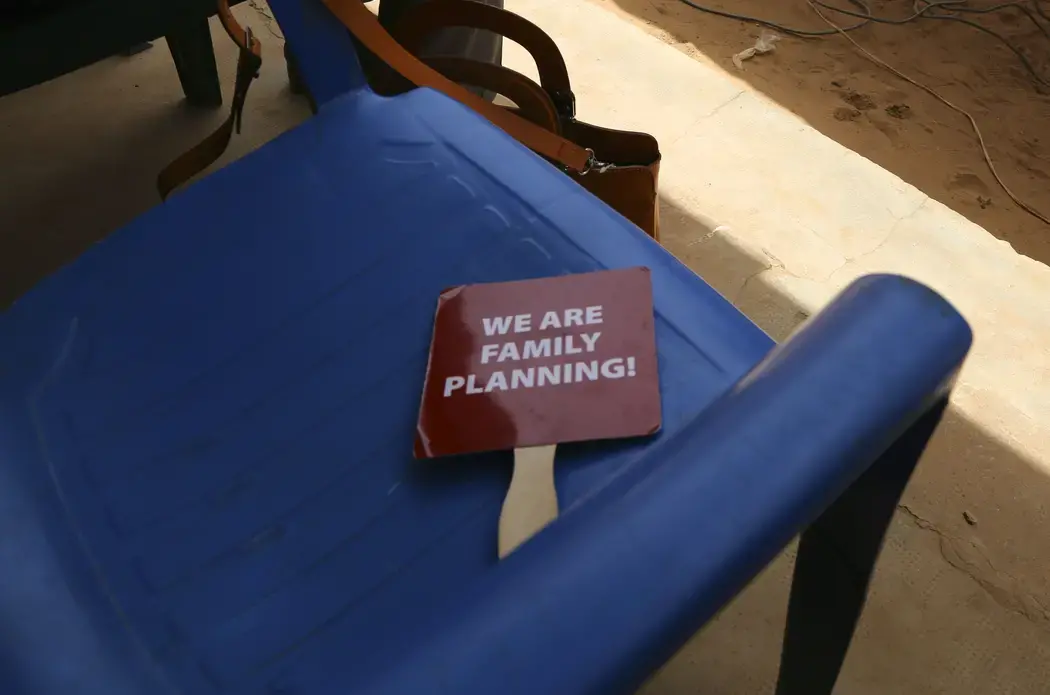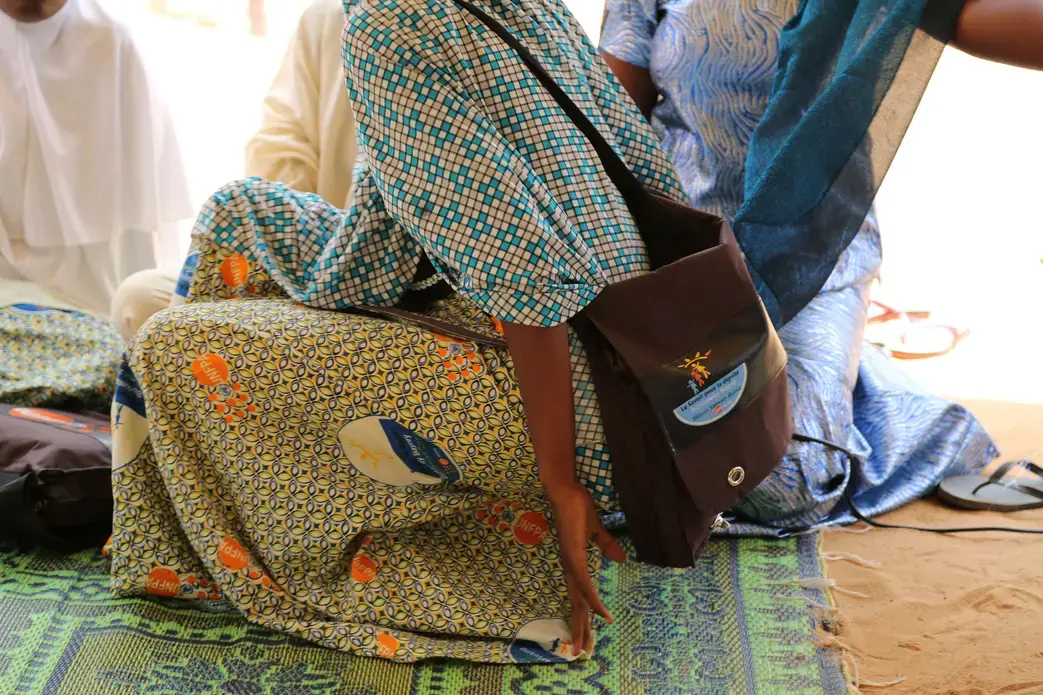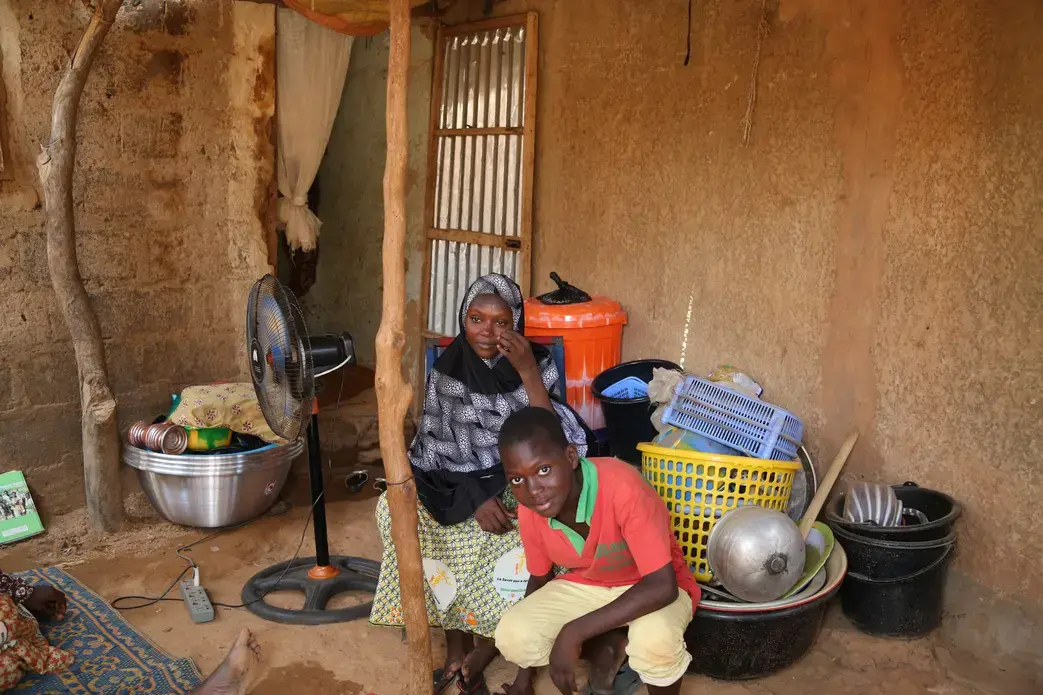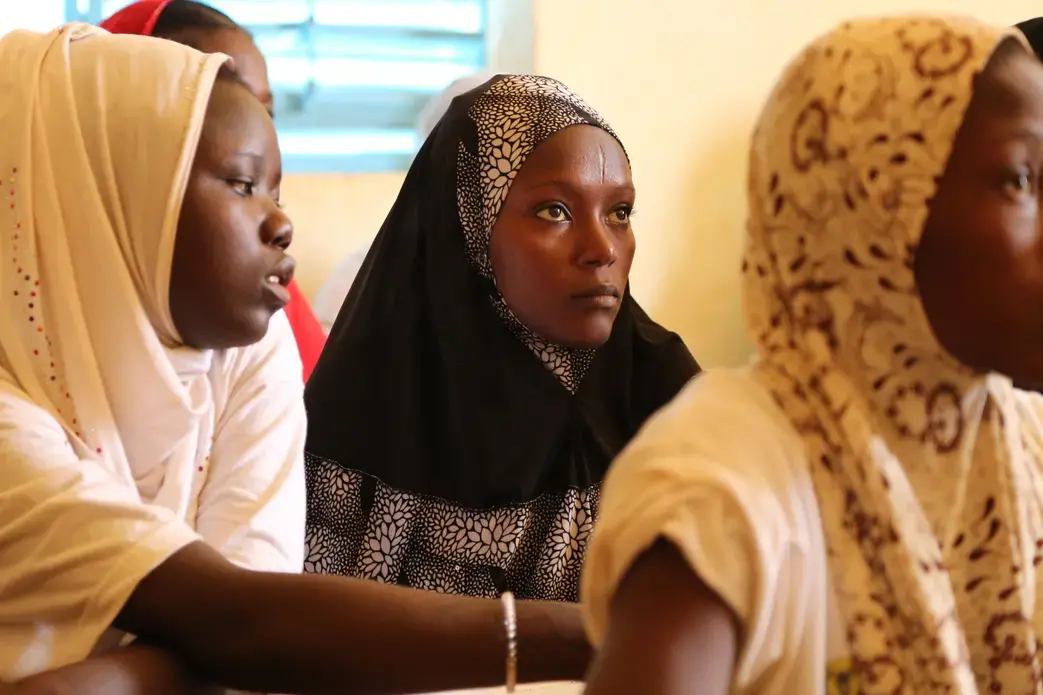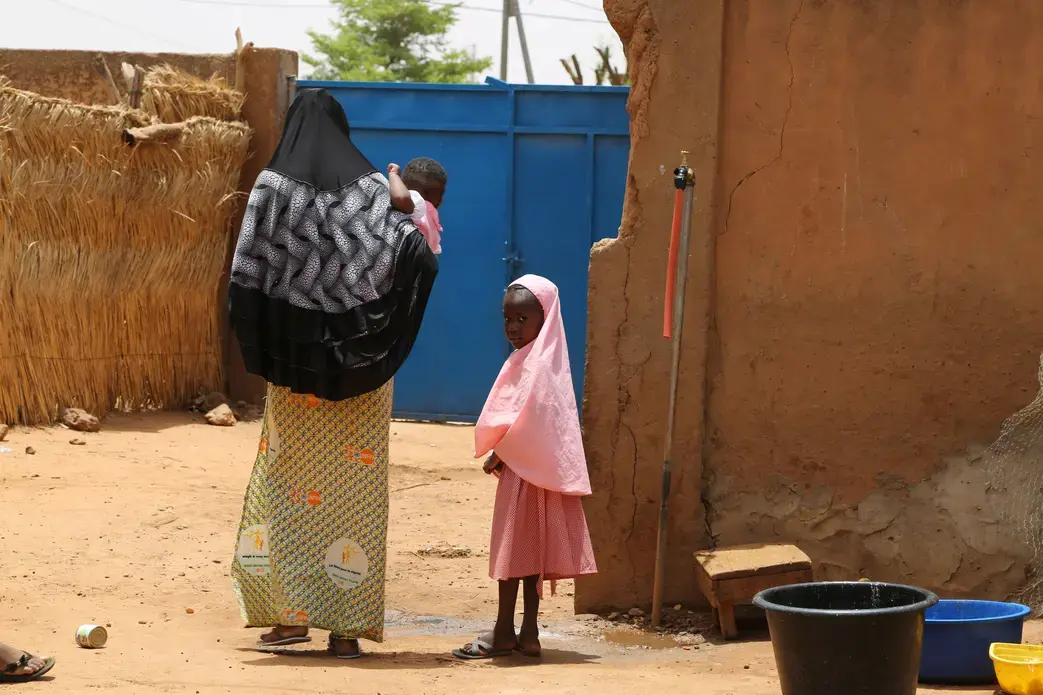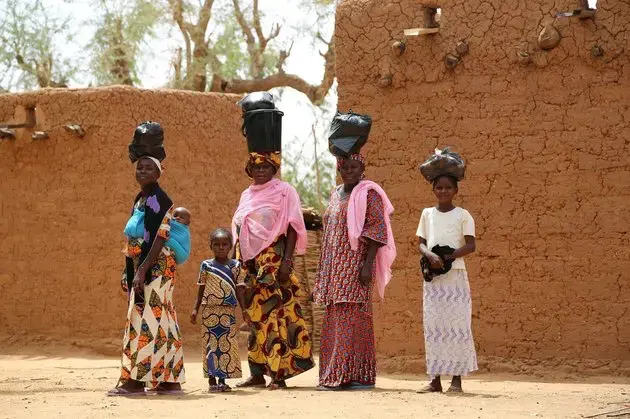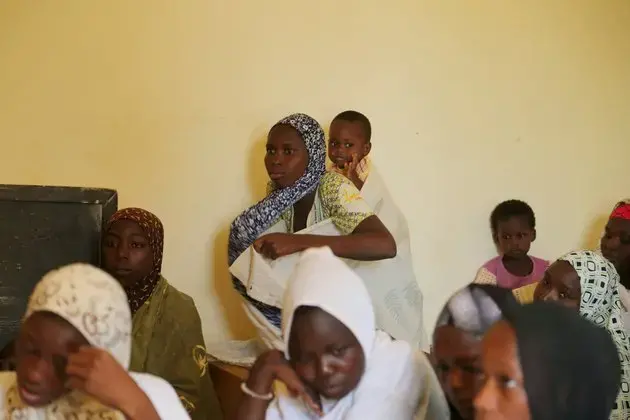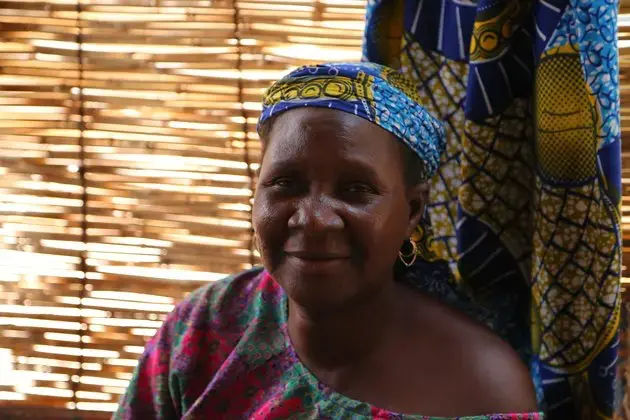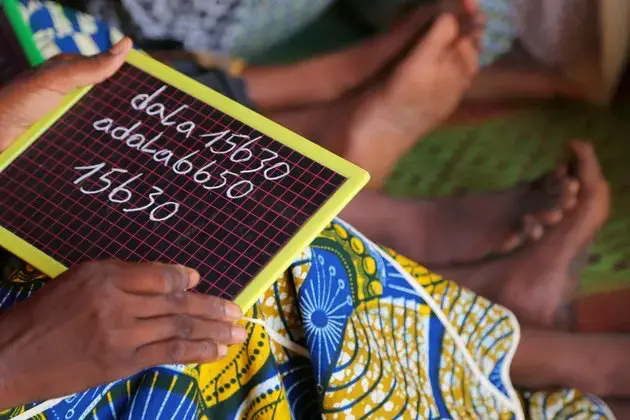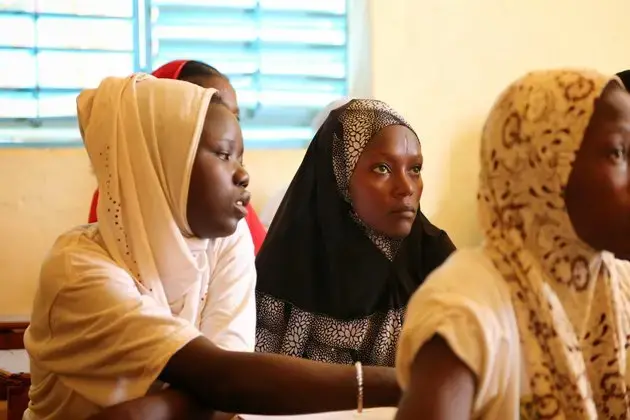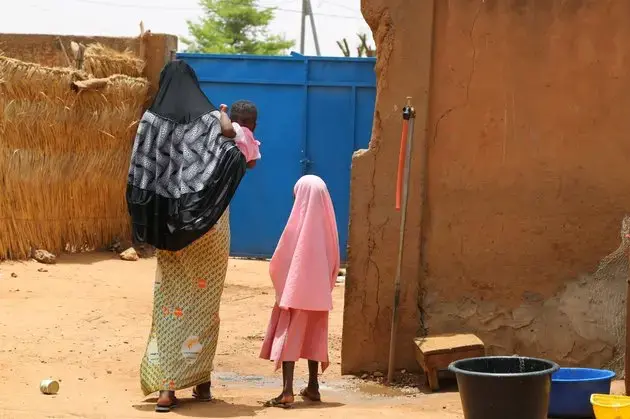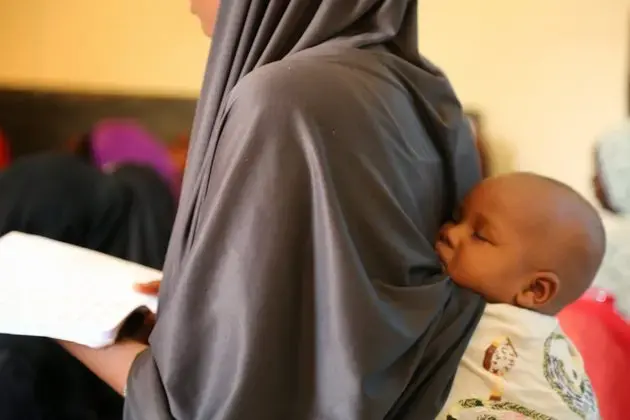A middle-aged man passes a 12-year-old on the street. He stops her, tells her she's beautiful and says he wants to make her his wife. The girl lowers her eyes in deference but shakes her head "no." The man persists, following her home. Her father, who looks roughly the same age as this mystery man, readily accepts the proposal. The girl respects the decision. A year later, her new husband returns to the home of the girl's parents to tell them she has just died giving birth to their first child.
The end.
Applause fills the makeshift amphitheater as the actors – four teenage girls, two dressed as men – take a bow. They are the authors of the unexpectedly provocative skit, which they've just performed for parents, teachers, curious neighbors, the local imam and the mayor of their small village near Niger's border with Mali.
Fati Yahaya rests her chin on her arm draped over the back of the plastic chair in front of her—riveted by what she's witnessed. She is one of the more than 100 young women between 10 and 19 in the audience. They sit in pairs and groups of four and six, intentionally identifiable by their matching iros, rectangular pieces of cloth they wrap around their waists. Patches proclaiming "Knowledge for Dignity" in French ("Le savoir pour la dignité") and their tribal Hausa ("Burkintarey Bayrey. Illimin Zaman Dunia") embellish the green, orange and white geometric patterns on the United Nations-provided fabrics.
The iros, which the girls can customize to their individual tastes by trimming, sewing or swaddling as they please—are just one piece of coordinated offerings gifted to them for joining the Adolescent Initiative—dubbed "Illimin" or knowledge at the suggestion of one of the participants. They're also given black canvas shoulder bags, books and pencils adorned with the same motto. The idea being to encourage envy among their peers who might previously have viewed marriage at 13 to a wealthy 40-something farmer as a marker of success.
"We want to do three things," explains Monique Clesca, the United Nations Population Fund Representative in Niger. "We want to educate these girls and give them an opportunity for longer and healthier lives, we want to normalize these same concepts for the community at large and we want the 'cool' label so teenage girls—who are universally drawn to trends and fitting in—will want to participate."
The initial pilot phase of the five-year program, which began in August 2013, follows a vulnerability analysis carried out by UNFPA Niger in 2012, and developed with the participation of numerous stakeholders, including the central government based in the capital, Niamey, regional leaders such as prefects, village elders and local imams (Niger is a majority-Muslim country) and carried out by Lafia Matassa, a local non-governmental organization.
Two-thirds of adolescent girls in Niger are married before they turn 18 and one-third before they turn 15, according to 2013 statistics obtained by the United Nations Population Fund (UNFPA). Cultural norms dictate that women must prove their fertility within the first year of marriage, and half of all girls in the West African country of 17.8 million become mothers before they turn 18.
More than three-fourths of these same girls, who go on to have an average of 7 children, are illiterate and 80 percent are very, very poor.
While UNFPA found that maternal mortality dipped slightly from 646 in 2006 to 535 in 2012, more than a third of all deaths of women between ages 15 and 19 are due to complications during pregnancy and delivery.
At just 22, Fati's mother had given birth to six children and her young body began to shut down from the strain. Severe back spasms made it excruciatingly painful to stand up, let alone carry and care for her young children. Fati's father had a first wife who was raising eight children of her own and had no desire or energy to take on a half dozen other hungry kids. So he divorced his second wife, sending her back to her own parents who lived in Benin.
Among the Hausa tribe—predominant throughout Niger and the largest ethnic group in West Africa—divorce occurs almost as frequently as marriage, crucially though only in those instances when the husband initiates the proceedings. Custody of the children almost always goes to the father but they are raised by one of his sisters or his mother. In this case, the six children lived with an aunt and uncle in Niamey, seeing their father regularly until he moved with his remaining wife and other children to Nigeria in the south.
Ten years later, Fati's older sister, Bayo, died at 15 after giving birth to a son, Abdoul. And Fati herself nearly suffered a similar fate after developing a postpartum hemorrhage that left her hospitalized for five months following her own son's birth.
"People still grapple with adolescent pregnancy in the West and don't know what to do about it. The difference in Niger is that 95 percent of these young girls become pregnant within marriage. And instead of one child, they have six or seven or eight or nine. That's the big issue here," says Clesca. "And then you add in all of these subplots about near total poverty, tradition and religious observance. This is the norm. And we're trying to create a new normal."
Keeping Boko Haram At Bay
After the eight-month-long pilot module concluded in April 2014, the NGO and UNFPA began conducting a review and planning for the official inaugural phase of the program.
"The girls had to be between 10 and 19. They had to be out of school or never in school in the first place. They could be married or not married," Clesca says. "We also prioritized the ones who were living with one parent. That increased their vulnerability. There are hot spots in terms of risk for the girls—four areas in the south where the rate of child marriage is very high—close to 85 percent."
"In Maradi and Zinder, which border northern Nigeria, some of the girls can't even go out at all. They are cloistered. That's because of Boko Haram. Nothing else," Clesca said, referring to the militant Islamic group that has attacked and kidnapped school girls in Nigeria, claiming it "haram" or forbidden, for Muslims to educate girls or take part in any political or social activity associated with Western society.
"Zinder and Maradi are very conservative just like northern Nigeria. It's the same tribe. They are all Hausa," she says, noting that there was a small attack along the Niger-side of border on May 26.
"The Nigerian Army is fighting Boko Haram particularly up north where the group is strongest. And as they pursue them, some members are fleeing," Clesca says, adding: "We already have close to about 50,000 refugees from Nigeria who have come in the last six months and there are bound to be some sleeper agents within that group."
To find "the most vulnerable" adolescent girls for the pilot phase, the UNFPA-backed NGO reached out to village elders, parents and teachers from 40 counties throughout the country who went porte à porte ("door to door") to explain the program.
"Once we would identify an area, we would hold a community meeting with parents, chiefs and anyone else who was interested to explain what we have to offer and ask whether they want the program to become a part of the community," said Issa Sadou, the UNFPA Niger officer in charge of Gender and Fistula Issues.
Each of the communities then formed two groups of 20 girls (1,600 total) who met biweekly for the next eight months, participating in a curriculum that included learning about sexual and reproductive health, hygiene, gender-based violence and access to and use of contraceptives. They also took literacy classes and obtained birth certificates.
"It's crucial to me that there's proof of their existence," Clesca says, explaining that in much of the country wives, daughters and sisters are not seen as independent of the family unit.
"Here, individuals don't matter. Communities do. But we've seen a breakdown of communities because these women who are themselves children are having babies—one right after another—and their bodies are shutting down. They're either dying or becoming unhealthy and thus undesirable to the point where their husband brings in a new and even younger wife to begin the process all over again."
Less is More in Niger
The family planning component is of particular concern to the national government and was a primary selling point in securing the support of bureaucrats in Niamey who are betting on voluntary programs like this one to combat the myriad of social and economic problems threatening the future of the landlocked nation with the world's fastest growing population.
From three million in 1960, Niger's population grew to just over seven million in 1988 but skyrocketed to 17 million in 2012. Pervasive poverty and malnourishment coupled with limited access to education and employment and a shrinking amount of arable land are just a few of the resulting challenges confronting the country where two-thirds of the population are under 24 and more than half are under 15.
President Mahamadou Issoufouhas has publicly declared his intent to address the multiplying problems by investing in programs that he says will reduce the prevalence of early marriages from 60 to 40 percent and the number of children per woman from seven or eight to five by 2015.
"If politics and terrorism don't mess things up and they can get at least a 50 percent rate of contraceptive use and a significant reduction in child marriage by 2020, we'll start to see some big changes elsewhere too," Clesca said. "They already have oil, they have uranium so if you have some aspect of good governance and re-investment of that the door will be open for further progress."
Illimin 101
Fati and her family heard a bit about these lofty goals when a UNFPA-approved volunteer visited her uncle's mud-brick compound last summer. But her participation had very little to do with aiding in a course correction for the country. She just wanted to steer her own ship into new waters.
For many parents, one of the benefits of losing a daughter to marriage is gaining the protection from social stigma associated with having a pubescent girl sitting around the house or walking to the market alone, vulnerable to casual sex and out-of-wedlock pregnancy, explains her aunt, with whom Fati lives alongside her grandmother, younger cousin, nephew and two nieces. An idle daughter is a daughter more likely to be or to appear to be tempted, the distinction is unimportant, says Fati's aunt.
This is a common and compelling concern for many mothers and caretakers of daughters here—even for those whose girls have just completed the pilot phase of the empowerment program. Clesca says UNFPA is still compiling statistics about those who "graduated" and those who "dropped out" or "dropped in" late but there are at least two dozen adolescents under 16 who left early to get married, knocking the central pillar of the program.
"When the girl is perceived as doing something wrong—like getting pregnant before marriage—she is shamed. But she is not the only one. The mother is shamed as well," Clesca said. "That's one reason so many mothers push for their daughters to get married so young."
One of the strategic incentives of the program is in offering a reputable, safe place for adolescent girls to go during the day. And the NGO has taken pains to protect the girls' "honor."
"A key element of the delivery model is to have the girls in safe places—places that the community deems as acceptable such as a health center or the backyard of the mayor's office," Sadou explains.
While the teachers are usually male, an older woman, typically between 20 and 40 who has at least a primary school education, observes from the doorway. Her presence signifies safety to the families of the participants.
Homework— and lots of it—also keeps the girls busy during their downtime.
"She's happier when she's solving these problems instead of just sitting here," said Aniweta, Fati's aunt.
While she can write little more than her name and the French alphabet, Fati's speaking skills are improving—she grew up only conversing in Hausa, the language of the largest ethnic group in West Africa—and she's learning to sound out the words in her 10-year-old nephew Abdoul's French textbooks.
Niger, which became a French colony in 1922, secured independence four decades later. French remains the official language but few outside the small professional class in Niamey actually speak it.
While Abdoul attends a French-speaking school several streets away, Fati has begun conducting makeshift lessons for herself and her young female relatives inside the compound. Whatever she learns from the Illimin classes, she shares with her nieces and female cousins. She reads her homework aloud and dictates the problem-solving techniques she's applying to math and reading-comprehension questions.
Many girls do this, according to Amina Boubacar, the program administrator who has at one point or another met every one of the 1,600 participants.
And many more end up "auditing" the classes.
"After the first couple of months, we started to see the friends and sisters of the program participants hanging around outside the door or leaning against the wall in the back of the classrooms," Amina said.
And this is a good thing. Popularity, at least in this case, breeds consent. And normalizing the program and its key tenements—education for all girls, late(r) marriage and reliance on family planning to have fewer children—will have a long-term impact, at least that's the hope of the creators.
"Very few mothers or their daughters want to be 'revolutionaries,'" Clesca says. "Why delay marriage and face the condemnation of neighbors and family members and the threat, in their minds, of out-of-wedlock pregnancy? There's very little incentive. But there's safety in numbers. When a dozen families in a community decide not to marry their daughters, it's easier to make a similar decision."
That's the working theory. In practice, it's too early to say. Beiba, Fati's shy 15-year-old cousin, idolizes the older girl and has watched with curiosity and a hint of longing as the 19-year-old has been granted the freedom to leave their compound for entire afternoons to sit alongside friends and learn things beyond Beiba's frame of reference.
She says she's eager to marry but wants to participate in the next round of the program first. Fati listens impassively—she has refrained from going into the most brutal details of her own marriage at 14 around her younger relatives. But she's wary of the institution in general and adamantly against it for girls younger than she is now.
The New Wife
The day Fati's father deposited her at her new husband's doorstep, she met the five children of the first wife, all of whom positioned themselves as a human blockade in front of the open-air entrance to the family's round-shaped mud-brick home. Not wanting to enter anyway, she sat two yards away next to three goats under the shade of an iroko tree until the sun went to sleep.
She describes this afternoon as the happiest hours of her two-year-long marriage. Eventually the children's' mother, an aggrieved woman in her late 20s named Dayaba, arrived home and invited Fati inside. Why anger their husband who would have no patience for hazing antics? She certainly wasn't pleased about Fati's presence but her mother-in-law's outspoken opposition meant she could go about her business with the knowledge that this girl would suffer, just as she had, at the older woman's hands.
And how. Fati's mother in law arrived the next morning and became a near constant companion like a living ghost intent on haunting her daylight hours. She was upfront in justifying her antipathy—she'd wanted a different girl for her son. And Fati was honest in return. She too wanted a different girl—any girl—to take her place.
The mutual understanding did not prevent either party from acting out. In addition to withholding food, Fati's mother-in-law would regularly thumb her on the back of the knees with the family's bulky metal saucepan and Fati would run away. Not from the physical blows that came during the day so much as the spousal rape that happened nearly every night.
The nighttime was reserved for Mourtala, her husband whom she rarely saw until the first wife and her three daughters had gone to sleep, or pretended to, on their corner mattress. Even then the darkness made any normal recognition difficult. The pointy bones in his knees. The milky whites of his eyes. The coarse hairs on his knuckles. These are the physical attributes that Fati remembers or imagines she saw rather than just felt.
She refers to sex as opening the door to her room. A door she could not keep locked or barricaded closed. Again and again her husband would break it down.
Her iro concealed new bruises upon old bruises around her vagina, neck and arms and raised and raw welts covering her legs and buttocks. But Mourtala's concern centered on what the garment didn't cover—a baby bump. A failure to get pregnant is indeed a failure—by the wife but affecting the husband, whose reputation is often determined by the size of his brood.
Again and again, he forced his way into Fati's room. Yet it remained empty.
"See, she's broken," the mother-in-law insisted, rarely missing an opportunity to rap her daughter-in-law's malfunctioning abdomen for emphasis.
"And please let it stay that way," Fati would pray.
The first year passed with Fati and her mother-in-law suggesting a divorce as an agreeable solution to everyone's problems. Mourtala, fed up by his mother's badgering and his wife's infertility, began considering the idea. But for a price. Fati's uncle would have to agree to pay back her dowry (350,000 West African CFA or $730 USD) with interest.
Her father had no interest in facilitating a divorce, especially on his own dime, but he informed his brother with whom Fati lived in Niamey and he went about bartering his possessions and asking neighbors to borrow money. After 10 months of selling and saving, he bought Fati's freedom.
Blood Ties
During the 10 months her uncle was struggling to repay the dowry, Fati became pregnant. Ironically, Mourtala had all but stopped demanding regular sex, losing interest in her and mostly disappearing from her daily life after it became evident her parents would find a way to get him his money back. But her mother-in-law maintained her habit of abuse withholding even more meals and throwing kitchenware at her whenever she caught her scavenging for leftovers.
As a result, the pounds fell away from Fati's already willowy frame and she did not realize she was with child until well into her second trimester. To conceal the fact, she began sleeping on a bed of her own clothing outside the home and befriending the seven-year-old daughter of her husband's first wife who would routinely slip her one of the uncooked potatoes she was tasked with boiling for the family.
They could have been sisters. Fati still thinks of her and wonders whether she's started menstruating. She hopes not. Being a "late bloomer" is about the only temporary stopgap to marriage for most young girls she knows. Although in many cases, the girl will go and live with the mother-in-law or sister-in-law until she's "ready" to be sent to the husband.
By the time Fati's parents arrived to take her back to Niamey, even malnourishment couldn't hide her swollen ankles and seven-month bump. But no one objected to her departure—preferring to pretend the growing child was as much a figment of imagination as his mother.
Still, she was too weak and too far along to travel back to Niger until she gave birth – an initially unremarkable event that occurred early in the morning of the rainy season when sand pebbles and pieces of plastic bottles pelted her uncle's thatched roof. She labored through the night and her aunt came and knelt down beside her when her excruciating cries signaled it was time to push.
Mujaheet, the length of three potatoes and not much heavier, came quickly. But the pain didn't subside. Neither did the blood. So much blood, Fati remembers, noting that she felt it pooling around her feet as her mother wiped the same crimson fluid from her newborn. She passed out and remained in and out of consciousness for what her aunt says was the next five months. Brought to a clinic in Abuja, she stayed heavily sedated and nearly as weak as her young son.
A recent United Nations report on population and development beyond 2014 cited research showing "girls who become pregnant before age 15 in low- and middle-income countries have double the risk of maternal death and obstetric fistula than older women."
While their reproductive organs are underdeveloped another risk factor for these girls is lack of proper medical care during and after delivery.
"Women can't go to a medical facility unless her husband, mother-in-law or sister-in-law have authorized her to go. In Fati's case, she would have had to have the approval of her uncle with whom she was staying," Clesca said. "Often they wait too long or until it's too late and then have trouble even finding a close enough clinic."
Finally, Fati and Mujaheet regained enough strength to travel. But their homecoming was short-lived. Aniweta and her husband had fewer belongings and owed debts to neighbors who helped them pay for their daughter's divorce. Now they had two new occupants and mouths to feed just as the younger children in the home had started to grow and take up more of the limited space.
Fati's father said he'd take his grandson. His newest wife – just 15, his third – would care for the infant.
After all her surrogate parents had sacrificed, how could Fati object? It was her turn to sacrifice. Although she did not want to disappear from her son's life the way her own mother had disappeared 16 years earlier.
Reading, Writing & Sewing
Fati sits in between two friends, holding the paper booklet they're supposed to read from while their teacher jots notes on a large chalkboard at the front of the classroom. When he poses a question, nearly two-dozen hands shoot up, fingers snapping for emphasis and enthusiasm. He calls on a girl in a black abaya and matching hijab, the only one standing or, in this case, gently bobbing up and down—a young baby fussing slightly against her lower back.
Fati concentrates, her owl-like eyes enhanced by the black and white lotus-patterned khimar wrapped around her face.
She and the other neighborhood girls in attendance have met for six hours a day, six days a week for the past eight months. The literacy component of the program began just five weeks earlier. And this afternoon they are working through stories intended for the children who sit at their feet or roam between their desks. But these kids, some still in infancy and others, ages 3, 4 and 5, sketching figures with their fingers along the sand-covered floor by the chalkboard, would be lucky to get such an education now or later.
And their mothers don't take their own luck for granted. In between changing diapers, swaddling, soothing and distracting, their focus doesn't waiver.
Instead of relief, they express anxiety and disappointment when they step outside the three-building compound, a sort of YWCA-like community center for women that accommodates the UNFPA program participants but also offers vocational training such as sewing and tailoring. Teen-aged girls and their young children socialize on the smooth, cool ceramic tiles on the porch of the main building, grateful for the respite and refuge.
But reality sets in just steps outside the rust-colored walls. Young and old men, unemployed and sharing in a pervasive feeling of anxiety and disappointment of their own, stare, whisper and occasionally call out to the girls who return to their homes in pairs or groups of three or four. Older women, many of whom have been walking up and down the nearby road all day trying—and usually failing—to sell the same garments these girls are learning how to make, eye their younger counterparts with resentment, wariness and jealousy.
And the girls notice everyone. Feel every stare. Hear every word. They know their time is running out on the other side of the wall. Soon they'll be loitering out front, watching a new group of girls with envy. Even though they have learned to sew, most of the girls will not be able to afford their own sewing machine or fabric. Even though they have learned to subtract and add, most of the girls will not have reason to deploy those skills. Even though they can read, most of the girls will not have an opportunity hold a book or a newspaper.
That's the reality. At least at the moment. As the NGO and UNFPA Niger begins reviewing the pilot module, the one consistent critique they've heard from the participants is that they want more job training or, even better, more job opportunities.
"These women want to work. If they don't come out of this program with a job, their families are very likely to think about marrying them right away again because otherwise they'll still see a girl who just sits around the house all day," Clesca said. "We're taking all of these suggestions seriously and looking for creative solutions as we bring the program to scale. I don't just want to try and secure funding for thousands of sewing machines."
Clesca describes "sewing" as a euphemism for "job"—any job. "These girls have never considered the possibility of doing something outside the home and then aid groups or government officials come along and tell them they need to learn how to sew."
"I think they can do more than that. Why not teach them about green jobs? Why not teach them how to grow lettuce or onions or tomatoes? What about managing the uranium mines?" she adds.
Niger, a leading producer of ore, which is used to make steel, after Kazakhstan, Canada and Australia, has hardly profited from its largest export, operated by French-owned nuclear company Areva, with more than 60 percent of Nigeriens surviving on less than $1 a day.
Fati wants to parlay her beginner's education into a nursing career.
"I want to help girls who are like me," she said. Her family wants UNFPA to ensure she meets this goal. Or to get her a job period.
"We need them to pay for her schooling. We need them to give her work," her aunt said, simultaneously praising the empowerment program and implying it's about to leave her niece stranded.


